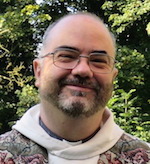 Continuing the series on 4Rivers Churches…
Continuing the series on 4Rivers Churches…
A personal casual survey suggests that of the four rivers, the least well-known is the River Rea. For a start people seem unsure as to pronunciation: is it the River ‘Ree’, or ‘Ray’ or even ‘Ree-ah’? “Never heard of it,” said a resident of Newnham Bridge, which is exactly where the River Rea joins the River Teme. Indeed, Newnham Bridge derives its name from the river!!!! How is that? Answer: the River Rea used to be called The River Neen (or Nene). Given that ‘ham’ means settlement, Neenham Bridge, or Newnham Bridge, is the settlement around the bridge over the river Neen.
Curiously, there is another River Rea where the Beorma’s Saxon tribe founded their settlement that became Birm-ing-ham (Beorma’s people’s place), and that River Rea flows into the River Tame. That river is definitely pronounced ‘Ray’. Rea is a very ancient word that means ‘to flow’ or ‘to run’. And the River Rae certainly flows
wildly in wet weather – its volatility contributes, in turn, to the volatility of the Teme and the Teme flooding further downstream, as mentioned in a previous article.
Our River Rae (formerly Neen) originates in Shropshire as Rae Brook, and flows through several places that reveal its older name: Neen Sollars, Neenton, Neen Savage. Between Ceobury Mortimer and Neen Sollars it defines the Shropshire / Worces- tershire border.
At one point it flows under the Elan Aqueduct.
The River Rea is the only river of the our four that starts outside our area, but ends ‘within us’. For us it represents those things that originate elsewhere, but impact on us, shape us, become part of us.
An obvious example is how world economics affects our local cost of living. But not everything is so obvious. Like the River Rae itself, some things ‘sneak’ into us without great awareness on our part: examples might be our preju- dices, unacknowledged racism, xenophobia, intolerance? Social Media can shape the thinking of our children in particular. On the other hand, many good qualities may have shaped us too, the very opposite of that list, and we have access to information and education unimagined a few years’ ago. The blessing and danger remains that we are
both enriched and diminished by attitudes and ideas that have taken root in us without being intelligently interrogated. These are reasons why Christians spend time in reflection and prayer in order to hold a mirror to the self. Outside help also comes to our scattered rural communities in the form of financial subsidies to our churches by the wider Diocese of Worcester.
A final quickie question: as we approach the Jubilee of Her Majesty, to what extent does her Christian faith and strong sense of duty inspire us to better things?
Rev Ted.
![]()
